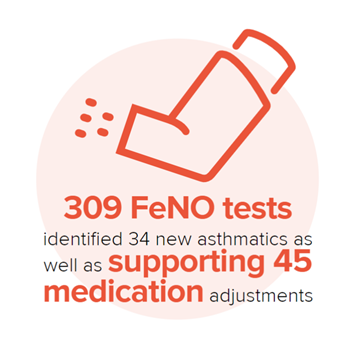Health Innovation East worked with partners across the region to help clinicians diagnose asthma through the use of fractional exhaled nitric oxide (FeNO) testing.
What is FeNO testing?
A fractional exhaled nitric oxide (FeNO) test measures the level of nitric oxide in the exhaled breath and can help differentiate between allergic (eosinophilic) and non-allergic asthma.
The test is non-invasive, easy to perform, and results are often available within seconds. It should be used alongside a patient’s own clinical history and other tests to support a diagnosis of asthma.
Why is this so important?
Over 5.4 million people in the UK suffer from asthma1 and the NHS spends around a billion pounds on asthma annually2, 90% of which goes directly on asthma medication.
Around 30% of patients currently diagnosed with asthma are suspected to have been misdiagnosed3, 4. This means they may be taking inappropriate or unnecessary medication. Measuring FeNO concentration in the patient’s breath helps support a more accurate diagnosis and ensures patients are prescribed the correct medication in the appropriate dosage. It can also be used to monitor a patient’s treatment.
Good adherence to treatment is vital to control symptoms and prevent asthma attacks, yet adherence is generally poor5.
This programme was featured in the Health Innovation Network Health Innovation Podcast.
How did Health Innovation East support this rollout?
FeNO testing was supported nationally by the Health Innovation Network as part of the Rapid Uptake Product (RUP) programme.
Across the East of England, Health Innovation East convened a range of stakeholders, including commissioners, secondary care NHS trusts industry partners and primary care providers to develop a plan for delivering FeNO testing in the region.
We worked with local integrated care systems and clinical commissioning groups to develop potential funding models and incentives to support uptake. We also gathered and shared real-world evidence from exemplar sites to evaluate the impact on patient outcomes and cost and operational benefits.
Impact
The FeNO testing programme aimed to improve patient care and outcomes through enhanced access to diagnostics and treatments for severe asthma. The full impact of the programme is still being finalised however interim data shows that between April 2021 and February 2023:
- An estimated 190,818 additional patients benefited from diagnostic FeNO testing across England.
- 41 Pathway Transformation Fund projects were completed to support wider adoption of asthma biologics and FeNO
For the clinical workforce delivering asthma care the programme has supported learning, training and development.
- More than 4,900 hours of specialist training was delivered to upskill those providing asthma care.
- 722 people attended webinars and learning collaboratives related to FeNO.
- The FeNO online resource toolkit has been accessed more than 13,500 times.
The national FeNO programme has now completed and have made substantial contributions to the transformation of asthma care in England while significantly increasing the access to and adoption of FeNO.
The Health Innovation Network is now transitioning to support healthcare inequalities as a national priority as part of NHS England’s Innovation for Healthcare Inequalities Programme (InHIP). Building on the transforming asthma pathways work, a number of AHSNs will support the respiratory aspect of the NHS England Core20PLUS5 approach, continuing to utilise the implementation and educational resources developed for the FeNO national programme.

In 2021/22, FeNO testing identified 34 new asthmatics as well as supporting 45 medication adjustments.
What are Rapid Uptake Products?
The Rapid Uptake Products (RUP) programme has been designed to support stronger adoption and spread of proven innovations. It identifies and supports products with NICE approval that align with the NHS Long Term Plan’s key clinical priorities, but have lower than expected uptake to-date. Learn more.
References
- https://www.asthma.org.uk/about/media/facts-and-statistics/
- Shaw D, Green R, Berry M, et al. (2012) A cross-sectional study of patterns of airway dysfunction, symptoms and morbidity in primary care asthma. Prim Care Respir J 2012; 21: 283-287.
- Joanne Kavanagh, David J. Jackson, Brian D. Kent (2019) Over- and under-diagnosis in asthma, Breathe Mar 2019, 15 (1) e20-e27; DOI: 10.1183/20734735.0362-2018: https://breathe.ersjournals.com/content/15/1/e20#ref-9
- https://www.asthma.org.uk/about/media/news/asthma-uk-study-1.1bn/
- Connected asthma: how technology will transform care (Asthma UK, 2016)
Share your idea
Do you have a great idea that could deliver meaningful change in the real world?
Get involved